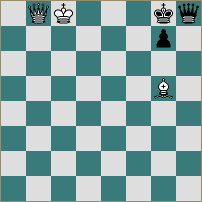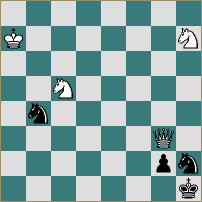Fantasy and Motivation
The Importance of Motivation
It is helpful to consider an equation sometimes used by sports psychologists:
In chess terms, the meaning of this is that a player's performance from one tournament to the next will vary entirely with his motivation. Knowledge builds up slowly over the years and does not vary much in a short time, whereas motivation has massive swings up and down, accounting for good and bad form. Of course, other factors, like luck, can play a part and the above equation only holds as a rough approximation. Looking at my own results in recent years I have averaged about 2475 with several results over 2600 and several below 2350. In a match between myself in good form and myself in bad form, the statistical implication of the above figures is that good form would win something like 8½ to 1½. The moral is clear; competitive players should treat their motivation very seriously indeed and look for ways to improve it. It is not only intelligence, talent for the game, knowledge and understanding or physical fitness that count; will to win, pure unadulterated motivation can also count for enormous variation in the levels that different players reach.
Performance = Knowledge + Motivation
Various Forms of Motivation
Not surprisingly, motivation varies both with time and from person to person. What makes one person tick may be of no consequence to another. But the question remains: why is it that so many people spend so much time on chess? I want to break the different types of motivation into two broad categories:
A) Power, success, glory, money, boosting ego, 'proving yourself', winning, point scoring, increasing your rating... etc.
B) Reasons intrinsic to the nature of chess, love of the game, pleasure from the flow of ideas, satisfaction from playing a good game...
These two categories are not exclusive, mutually or otherwise. People could play for mental exercise or social reasons, for example. However, most motivation could be described either as type A (competitive) or type B (aesthetic). I am not trying to argue that type B is 'better' than type A. I do not go along with 'It's not winning that matters, its taking part' - in fact I regard that as unprofessional and dilettante - but nor do I endorse 'Winning isn't the main thing, it's the only thing!' That is simply unrealistic. The point is that type B motivation exists and is very important for many reasons, not least that it can help you gain type A success! I gain pleasure from winning, even if the game was terrible. But I gain many times more pleasure from winning a good game. If the game is good technically (accurately played, say) perhaps that pleasure is partly type A since one could argue that it has a stronger ego-boosting effect. But if the game has a spectacular finish, an elegant and stylish episode or even a single surprising, powerful move I can get an enormously enhanced aesthetic kick. Incidentally it is better, for practical reasons, to enjoy such things after the game, looking back at it. Enjoying them at the board, while you are playing, can endanger the result! From what we can tell, most players, good and bad, have a similar experience. Winning in style generates enormous pleasure - a lovely, if occasional, reward for some of the pain and suffering involved in playing competitive chess. Perhaps currently the world's most strongly motivated player, Kasparov, is well aware of both types of motivation:
'I want to win, I want to beat everyone, but I want to do it in style!' Type B motivation is crucial even for less ambitious mortals. If it were just a question of winning or losing, if it were not possible to play a brilliant game, to make an incredible queen sacrifice, to play the occasional shocking or outrageous move, then I suspect many people would not play chess. It simply would not be worth it; such a difficult game and with so few rewards. It is clear that aesthetic, type B motivation is important for all chess players. If you can increase that motivation by increasing your knowledge and understanding of aesthetic ideas, your game should improve as well.
The Role of Fantasy
Many, many years ago I remember being particularly struck by the following position. I came across it as a young junior while reading the book Practical Chess Endings by Irving Chernev.
Win
A. Gurvich,
Bakinski Rabochi 1927
It seems White can do nothing to prevent the g-pawn queening, however... 1 Ne4! Intending to meet 1...g1Q+? with 2 Nf2+ forcing 2...Qxf2+ 3 Qxf2 with a win. Black finds a better defence. 1 ... Nd3! So that 2 Qxd3 g1Q+ leaves White with insufficient material advantage to win. White’s only way to win is quite breathtaking: 2 Qf2!! Nxf2 If 2...Nf1 3 Qh4+ wins. Also hopeless is 2...g1Q 3 Ng3+ so Black has to take the queen. 3 Ng3+!! Kg1
4 Ng5 A fabulous zugzwang. It is mate next move. Although my taste has changed over the years, and different ideas `turn me on' nowadays, the final position still makes a strong impression. (Later on in the book, once we have introduced our explanatory concepts, we will be able to discuss the aesthetic qualities of such examples in more detail. For the time being readers can judge the positions for themselves.) I have to admit that I used to dream of winning important games with the above finish. I suspect the next position also found its way into my subconscious life of the time:A very difficult study to solve, since White’s first paradoxically moves away from the action. Far more natural would be 1 Kd7+, but it does not win. The position after White’s fourth is an example of `domination' and for that the king is needed on b7. 1 Kb7+!! Kh7 
Win
F. Richter,
Suomen Shakki
2 Qh2+ Kg8
3 Qa2+ Kh7 Not 3...Kf8 4 Qa8+ and 5 Qxh8. 4 Qf7! Zugzwang. White wins since the black king and pawn cannot move (legally) and the black queen is captured if it moves anywhere along the eighth rank except g8. After 4...Qg8, 5 Qh5 would be mate. It was Freud who wrote that 'Fantasy is action in rehearsal!' Endgame studies are, essentially, well worked out versions of other people's chess fantasies. You can imagine a composer thinking 'Would it not be fabulous if a chess game finished like this..?' As the Freud quote suggests, these fantasies have a practical function. Studies show the full potential of what is possible in chess, the heights to which it can aspire. There can be very few chessplayers whose sense of wonder would not be awakened by positions such as the above. The positions in this book, and others, have motivated me generally, making me realise what a magical game chess is. They say chess is in the Russian soul; here is what Alexander Kotov thought of such positions (from his book Play Like a Grandmaster) '... Chess combinations are a sort of dramatic work of art, full of tension and aesthetic content. It is for this facet of the game more than any other that millions of people throughout the world love chess.' Chess may well be in the Dutch soul too. GM and journalist Hans Ree expressed the same sentiment much more succinctly: 'Chess is beautiful enough to waste your life for.' The former French champion, endgame theorist and composer, André Chéron, warns the 'practical' plodder of his possible error: 'The player who would shun the artistic endgame would thereby deprive himself of a spiritual training which is as useful as it is pleasing. If to this disregard he adds that of the problem, he can compliment himself in the knowledge that out of the noble game of chess he has drawn only one third of its potential intellectual enjoyment.'
Extract from Secrets of Spectacular Chess (J. Levitt,128 pages,Batsford,1997,£12.99 ISBN 0 7134 8049 1)
